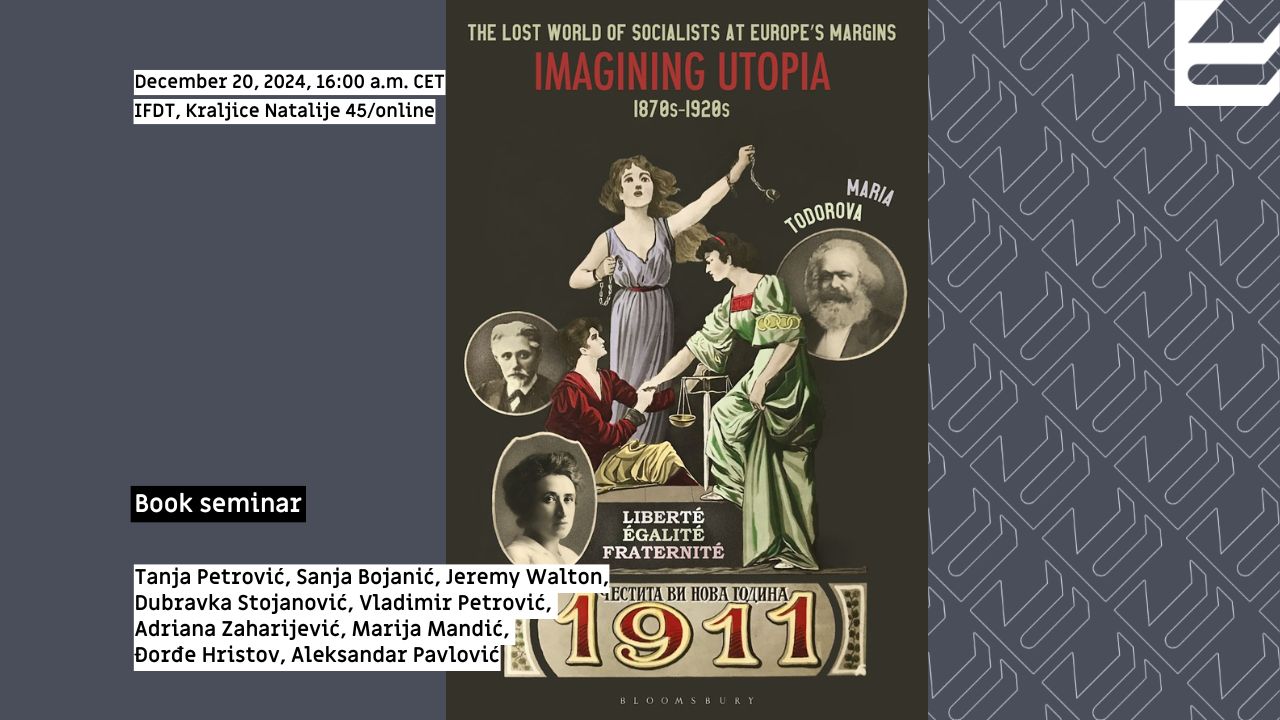
[Book seminar] Seminar on Maria Todorova’s book The Lost World of Socialists at Europe’s Margins: Imagining Utopia
IFDT organises live event and online discussion with Maria Todorova about her book The Lost World of Socialists at Europe’s Margins: Imagining Utopia, 1870s–1920s (London: Bloomsbury Academic, 2020).
Participants:
- Tanja Petrović (Institute of Culture and Memory Studies, Ljubljana)
- Sanja Bojanić and Jeremy Walton (Center for Advanced Studies, University of Rijeka)
- Dubravka Stojanović (Faculty of Philosophy, University of Belgrade)
- Luka Filipović (Institute for Contemporary History, Belgrade)
- Marija Mandić & Đorđe Hristov (Institute for Philosophy and Social Theory, University of Belgrade).
Moderator: Aleksandar Pavlović
Maria Todorova’s book is devoted to the ‘golden age’ of the socialist idea, broadly surveying the period in and around the time of the Second International. It critically examines the promise for an alternative socialist utopia from 1870 to the 1920s. Todorova brings in the experience of the periphery in a comparative context in the belief that the margins can often elucidate better the character of a phenomenon, and de-provincialize it from essentialist notions. In doing so, The Lost World of Socialists at Europe’s Margins moves beyond the traditional historiographical emphasis on ideology by looking at different intersections or entanglements of spaces, generations, genders, ideas and feelings, and different flows of historical time.
The study provides a social and cultural history of early socialism in Eastern Europe with an emphasis on Bulgaria (but mentions Dimitrije Tucović and Svetozar Marković), arguably the country with the earliest and strongest socialist movement in Southeast Europe, and one that had a unique relationship to both German and Russian social democracy. Based on a rich prosopographical database of around 3500 biographies of people born in the 19th century, the book addresses the interplay of several generations of leftists, looking at the specifics of how ideas were generated, received, transferred and transformed. Finally, the work investigates the intersection between subjectivity and memory as reflected in a unique cache of archival materials containing over 4000 documentary sources including diaries, oral interviews, and unpublished memoirs. A microhistorical approach to this material allows the reconstruction of ‘structures of feeling’ that inspired an exceptional group of individuals.
The seminar involves eight scholars from the region of diverse background (historians, philosophers, philologists, social scientiest) offering their readings and inputs, thus exemplifying how the book resonates from the various disciplines of humanities and social scienties.
Maria Todorova is a renowned historian specializing in Balkan studies, best known for her seminal work, Imagining the Balkans (1997), where she introduced the concept of “Balkanism,” analyzing Western perceptions of the region. Her research encompasses the Ottoman legacy in the Balkans, nationalism, socialism, and post-communism in Eastern Europe. She has held academic positions at various institutions and is currently Professor Emerita at the Center for Advanced Study, University of Illinois at Urbana-Champaign. Todorova’s contributions have earned her numerous accolades, including honorary doctorates and membership in the American Academy of Arts and Sciences.
